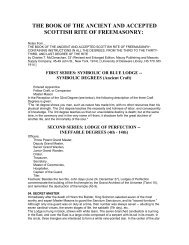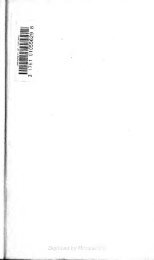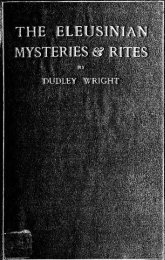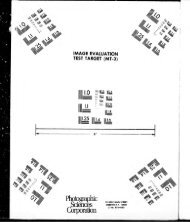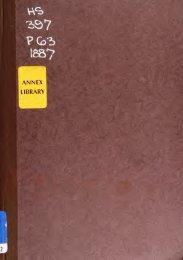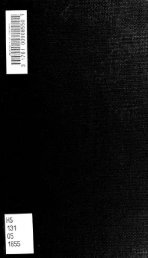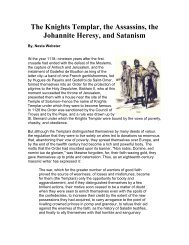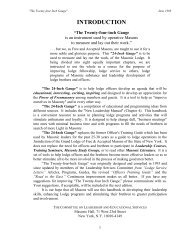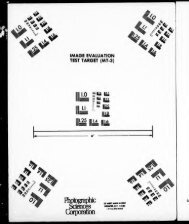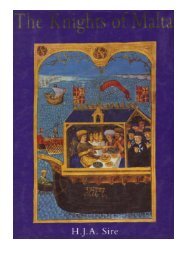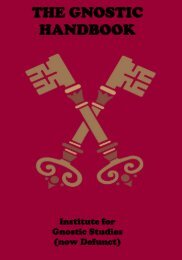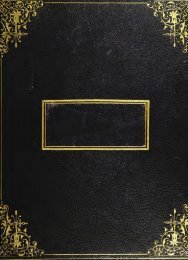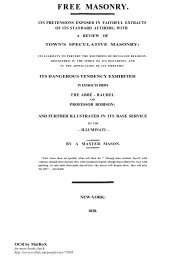Scottish Rite Masonry Illustrated - The Masonic Trowel
Scottish Rite Masonry Illustrated - The Masonic Trowel
Scottish Rite Masonry Illustrated - The Masonic Trowel
Create successful ePaper yourself
Turn your PDF publications into a flip-book with our unique Google optimized e-Paper software.
220 KNIGHTS OF THE BUN.<br />
be overlaid with fiction and error, and irretrievably lost.<br />
Though masonry is identical with the ancient mysteries,<br />
it is so in this qualified sense, that it presents but<br />
an imperfect image of their brilliancy, the ruins only of<br />
their grandeur and a system that has experienced,<br />
progressive alterations, the fruits of social events and<br />
political circumstances. Upon leaving Egypt, the mysteries<br />
were modified by the habits of the different nations<br />
among whom they were introduced. Though<br />
originally more moral and political than religious, they<br />
soon became the heritage as it were of the priests, and<br />
essentially religious, though in reality limiting the<br />
sacerdotal power by teaching the intelligent laity the<br />
folly of the countries into which they were transplanted.<br />
In Greece they were the mysteries of Ceres,” in Rome,<br />
the good goddess, in Gaul, the school of Mars, in Sicily,<br />
the academy of the sciences. Among the Hebrews, they<br />
partook of the rights and ceremonies of a religion which<br />
1)lilCed all the powers of a government and all the knowledge<br />
in the hands of the priests and Levites.<br />
‘Phe Pagodas of India, the retreats of the Magi of<br />
Persia and Chaldca, and the pyramids of Egypt were<br />
no longer the sources at which men drank in knowledge.<br />
Each people, at alb informed, had its mysteries. After a<br />
tinie the temples of Grecce and the school of Pythagoras<br />
lost thcir reputation and freemasonry took their place.<br />
IN1ai~onrv, when properly expounded, is at once the interpretation<br />
of the great book of nature, the recital of<br />
physical and astronomical phenomenon, the purcst<br />
philosophy and the place of deposit, where, as in a treasurv,<br />
are kept in safety all the great truths of the primi-<br />
irate SBE—”Ceres. Among the Romans the goddess of agricuittire.<br />
I.,,t amo,,g the more poetic Crocks she was worshiped utider the namc of<br />
Deneter. as tue symbol of the prolific earth. To her is attributed the t,t~<br />
stitati ii of the ~ieueinian Mysteries in Greece the most popular of iii<br />
the anitent initiationa.”—3IAskei’5 Encyciopadla of Fr.emasonq. Axtiole<br />
Cores.<br />
INITIATION. 221<br />
tive revelation, that form the basis of all religions. In<br />
the modern degrees, three things are to be recognized:<br />
<strong>The</strong> image of primeval times, the tableau of the<br />
efficient causes of the universe, and the book in which<br />
are written, the morality of all peoples, and the code by<br />
which they must govern themselves if they would be<br />
prosperous. 545 degree represents man, when he had<br />
sunken <strong>The</strong> first from his original lofty estate, into what is most<br />
improperly styled a state of nature. He represents in<br />
that degree the rough ashler, unfit to form a part of the<br />
spiritual temple, the pagan who had lost all the great<br />
primitive truths of the original revelation. He maintained<br />
the same character in the ancient mysteries. He<br />
is emphatically a profane,”’ enveloped in darkness, poor<br />
and destitute of spiritual knowledge, and emblematically<br />
naked.<br />
<strong>The</strong> material darkni~ss”’ which is produced by the<br />
Nets 386.—”Although the gotered Apprentice is hut a rough ashier.<br />
yet be is of good substance and sound at the c,,re <strong>The</strong> statue is in the<br />
block, a figure more graceful the,, human gelilus can create ‘the En.<br />
tered Apprentice has been J,,dged. by me,, expert in the ael,’ctiom, of<br />
material, to be prepared in heart’; in theory he was a Mason even before<br />
he entered at the northwest corner of the Lodge <strong>The</strong>re ia nothing In<br />
<strong>Masonic</strong> science that can do the work of heart-preparation, a,,d those<br />
master builders who have attempted, not of inferior materiala. to constroct<br />
the Freemasons’ wall, have ever and egregiously erred <strong>The</strong>refore<br />
is the gniered Apprentice one siready prepared in heart. Nor i~ this tyro<br />
in <strong>Masonry</strong> altogether ignorant of the principies of the society into<br />
which he desires to penetrate; some exoteric knowledge of <strong>Masonry</strong><br />
he must hsve had, for, in his petition, he declares that ‘he has long en.<br />
tertained a favorahie opinIon of the ancient and honorable Institution.’<br />
—Morris’s Kasonlo Dintin~, Aztiols Entered Apprentios.<br />
Note 317.—‘Profane. <strong>The</strong>re is no word whose technical and proper<br />
meaning differs me,re than this, in its ordinary use profane signifies<br />
one who is irreligious and irreverent. hut in its technical adaptation it<br />
is spplied to one who is igs,orant of ss,’red rites. <strong>The</strong> word is coinof<br />
the two Latin wor(ls pro and faannnn, and literally means<br />
~fcreor<br />
cients was<br />
outside<br />
one who<br />
of the<br />
was<br />
temple;<br />
not allowed<br />
and hence<br />
to enter<br />
a profanne<br />
the temple<br />
among<br />
and<br />
the<br />
behoid<br />
an-<br />
the mysteries. ‘Those. says yeast,,,. ‘were catted profane who were not<br />
initiated in the sacred rites. h,,t to whom it was showed only to stand<br />
before th~ temole—pro fano—not t., enter it and take part in the<br />
solemnities ‘—haokeys Encynlopadia of Freemason,~., Article Profane.<br />
Note 3U.—’<strong>The</strong> material darkness which ii preduced hi rtho hoodwinkj<br />
is an emblem of the dark,,csa of his so,,i He is deprived of eyen~.<br />
thing that has a vaine, and wherewith be could p,,rchasp food, to indicate<br />
his utter desiitntton of the mental wealth of primitive truth.”<br />
Pierson’s Traditions, lubject Entered Apprentice, page N.



